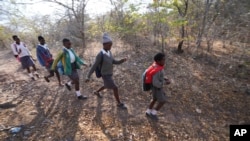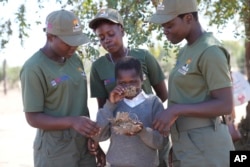In Zimbabwe, increased wildlife activity near people has put children in rural areas at greater risk of animal attacks while walking to school.
Officials and some parents hope a campaign to teach children how to identify danger could reduce risks.
No deaths have been reported, but student Esther Bote and her friends remain careful.
“We usually walk in groups to feel safer,” said the fourteen-year-old. The five-kilometer walk to school includes travel through thick forest.
Savé Valley Conservancy, a private group, and Zimbabwe’s parks agency run the program for school-age children. It teaches them how to recognize danger signs and how to coexist with wildlife.
Many students, like Esther, are now able to identify the footprints of animals and the sounds they make. They also know how to read the direction of the wind and when and where to seek shelter.
Dingani Masuku of Savé Valley Conservancy said wildlife affects children more than other people. He said children walk to school and often do household jobs like getting water and firewood. Such activity means they are outside often.
Masaku said, “That’s why we are targeting schools so that they can know how animals behave, what to do with the animals.”
He added that the campaign is trying to teach children “a sense of ownership,” so they “don’t see the animal as an adversary, but they see it as something beneficial to the community, something which should be respected.”
Education efforts
Recently at Chiyambiro Secondary School, a young woman was teaching children about the dangers of wild animals. The 18-year-old recently left school to become part of a group of young woman rangers.
“Don’t approach an animal. If it’s a lion, it’s looking for food. That’s why it’s in the community. It is looking for cheap, easy prey, and you could be the easy prey.”
Some of the children said they travel up to 15 kilometers to get to school. They said they have to start walking to school before the sun rises when animals such as hyenas are still awake and active.
An official from the national parks agency spoke to the children about why wildlife is important to the community. He said wildlife supports the country’s tourism industry and leads to job creation, such as the new ranger positions.
Alphonce Chimangaisu is the chair of the school development committee at the Chiyambiro Secondary School. He said parents hope the information campaign will make children safer.
“Some parents have stopped their children from going to school because they don’t know what might happen,” he said.
School officials in affected rural areas often must delay the start of the day’s classes and end them early. The president of the Amalgamated Rural Teachers Union of Zimbabwe, Obert Masaraure, said school officials are trying to let children walk to and from school during daylight hours. That is when wild animals are less likely to be around.
“We have reports of learners who have completely withdrawn from school fearing for their lives,” Masaraure said. He also noted that teachers who live far from schools are increasingly missing work. He said all these problems are making it more difficult for rural learners to get a “quality education.”
Tinashe Farawo is a Zimbabwe National Parks and Wildlife Management Authority official. He said wild animals are going into communities for food and water because of dry weather conditions, also called drought. The official said the parks agency is pushing for animal behavior and conservation training at schools around the country.
Farawo also said children teach their parents what they have learned. He said the agency has established environmental clubs at many schools to bring attention to the issue.
The official noted that conflicts had gotten worse because of drought. He said the parks agency had received between 3,000 and 4,000 emergency calls from communities battling wildlife in three years. In 2018, there were only 900 calls.
I’m Caty Weaver. And I'm Mario Ritter, Jr.
Farai Mutsaka reported this story for the Associated Press. Mario Ritter, Jr. adapted it for VOA Learning English.
________________________________________________
Words in This Story
adversary –n. an enemy
beneficial –adj. something that has a good effect or that provides something useful
ranger –n. a person who helps to supervise a forest area
approach –v. to move closer to something; to near
cheap –adj. at a low cost; easy to get
prey –n. an animal that is the object of a hunt
We want to hear from you.
Our comment policy is here.







Forum